Wilmot Annual Symposium Winner
Thursday, November 20, 2025
Catherine Caballero, a current 3rd year student in the Toxicology program, received a poster award for her poster titled "Targeted expression of Sirtuin 6 to bone marrow stromal cells reverses their age-dependent transcriptional signatures" at this years Wilmot Annual Symposium.
Congratulations, Catherine!
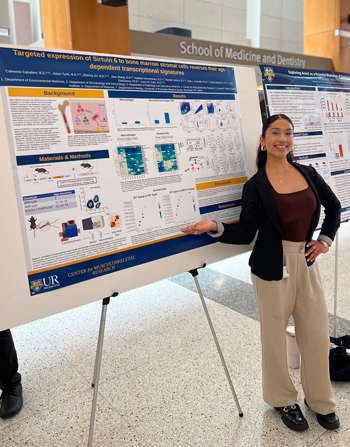
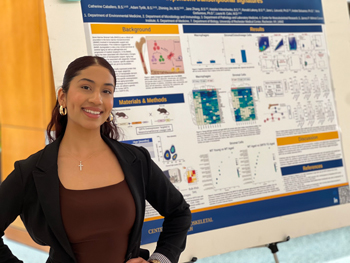
Current 4th year Toxicology student recognized with F31 grant
Friday, October 31, 2025
Knickole Bergman has received an F31 approved grant.
Title of Research: Perfluorooctanoic acid: a potential environmental modulator of susceptibility to gestational diabetes mellitus
Description of award: The Ruth L. Kirschstein National Research Service Award (NRSA) Individual Predoctoral Fellowship (Parent F31) enables promising predoctoral students with potenital to develop into productive, independent research scientists, and to obtain mentored research training while conducting dissertation research.
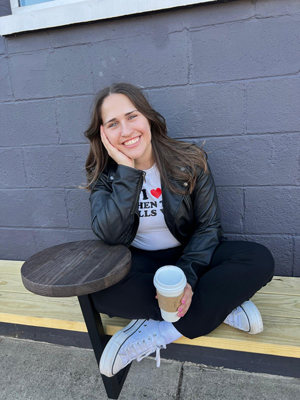
Knickole Bergman
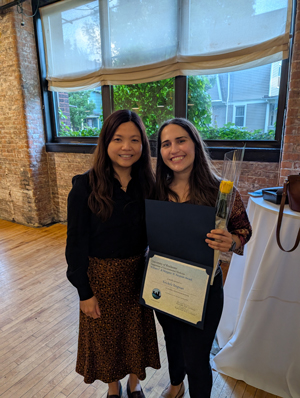
Knickole is accompained by Martha Susiarjo- Toxicology associate professor and Knickole's mentor
Undergraduate Research Fair 2025
Tuesday, October 21, 2025
On October 17th, 2025, pictured students- Pablo Reina-Gonzalez (4th year PhD student) and Rosebell Onuma (1st year PhD student) tabled the Undergraduate Research Fair 2025 in the Feldman Ballroom.
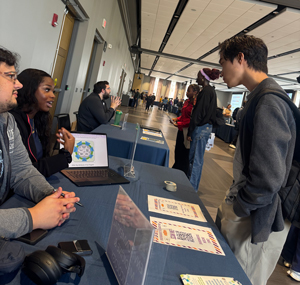
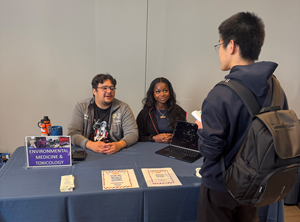
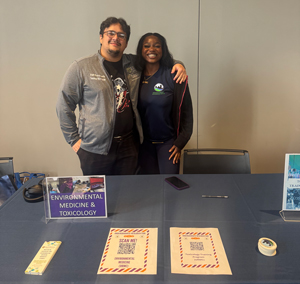
Toxicology trainees recognized at the 2025 GEPA Awards Ceremony, October 1
Wednesday, October 1, 2025
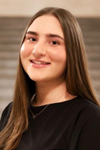 Penelope Pando (first-year predoctoral trainee) received a Provost’s Fellowship
Penelope Pando (first-year predoctoral trainee) received a Provost’s Fellowship
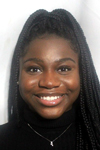 Rosebell Onuma (first-year predoctoral trainee) received a URSMD Meliora Scholarship
Rosebell Onuma (first-year predoctoral trainee) received a URSMD Meliora Scholarship
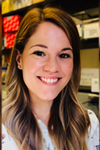 Erin Davis (postdoctoral fellow working with Prof. Kirsi Jarvinen-Seppo) received the Outstanding Postdoctoral Mentor Award
Erin Davis (postdoctoral fellow working with Prof. Kirsi Jarvinen-Seppo) received the Outstanding Postdoctoral Mentor Award
Congratulations!
Irfan Rahman quoted in "Nicotine-free’ vapes and pouches promise a buzz without the downsides. Health concerns remain"
Thursday, September 18, 2025
In the past couple of years, “nicotine-like” products have hit the market in the U.S., Europe, Australia and South Korea. They look like nicotine vapes and pouches, with similar flavors and sleek designs. Some provide a nicotine-like buzz.
But there’s a crucial difference: Outside Europe, these products aren’t subject to government oversight.
Researchers warn that at least one of these products’ nicotine-like chemicals, called nicotine analogs, may be more potent and addictive than nicotine itself — and that these products are sometimes marketed in misleading ways.
Nicotine analogs are synthetic, chemical compounds that closely resemble nicotine. Some activate the same brain receptors as nicotine, with a similar buzz and addictive properties.
These compounds aren’t new; tobacco companies started researching nicotine analogs in the 1970s in anticipation of future regulations that could reduce how much nicotine would be allowed in their products, according to a study of industry documents. But the companies feared this research would trigger more regulation, so the studies were shelved.
In 2022, the U.S. Congress acted in response to the proliferation of vapes containing synthetic nicotine. That lab-made compound has the same chemical structure and properties as nicotine extracted from tobacco, so lawmakers authorized the U.S. Food and Drug Administration to regulate products containing synthetic nicotine just as it does those containing naturally occurring nicotine.
After that, the industry showed renewed interest in nicotine analogs. Products containing these compounds soon appeared on the market.
“These products were intentionally designed to bypass regulation,” said Sven Eric Jordt, a professor of pharmacology and cancer biology at Duke University who has studied nicotine analogs.
Though sales data is limited, research studies say the market for nicotine alternatives is growing. Some companies that produce vapes containing nicotine also produce vapes with nicotine-like ingredients.
Irfan Rahman, a professor of environmental pulmonary health and disease at the University of Rochester, analyzed research studies of 6-methyl nicotine and found that it may cause more inflammation in lung capillary cells than nicotine. 6-methyl nicotine can damage those cells, potentially contributing to lung diseases such as chronic obstructive pulmonary disease (COPD) and lung cancer, he said.
Read More: Irfan Rahman quoted in "Nicotine-free’ vapes and pouches promise a buzz without the downsides. Health concerns remain"Irfan Rahman is honored as a ScholarGPS Highly Ranked Scholar
Wednesday, August 6, 2025
Dr. Rahman has been ranked in the top 0.02% worldwide and in the top 26 at the University of Rochester in his field.
Congratulations!
Read More: Irfan Rahman is honored as a ScholarGPS Highly Ranked ScholarJust how harmful is vaping? More evidence is emerging
Wednesday, July 9, 2025
“When vapes heat liquids to higher temperatures, they can release larger amounts of harmful chemicals that can seep into the lungs, enter the bloodstream, and flow to the heart,” says Irfan Rahman, a Dean’s Professor in the Department of Environmental Medicine.
Read More: Just how harmful is vaping? More evidence is emergingResearchers Find “Forever Chemicals” Impact the Developing Male Brain
Wednesday, July 2, 2025
“Forever chemicals” or per- and polyfluoroalkyl substances (PFAS) have been widely used in consumer and industrial products for the better part of a century, but do not break down in the natural environment. One PFAS, perfluorohexanoic acid or PFHxA, is made up of a shorter chain of molecules and is thought to have less of an impact on human health. New research from the Del Monte Institute for Neuroscience at the University of Rochester suggests otherwise, finding that early life exposure to PFHxA may increase anxiety-related behaviors and memory deficits in male mice.
Hopefully, this is the first of many studies evaluating the neurotoxicity of PFHxA.”
“Although these effects were mild, finding behavioral effects only in males was reminiscent of the many neurodevelopmental disorders that are male-biased,” said Ania Majewska, PhD, professor of Neuroscience and senior author of the study out today in the European Journal of Neuroscience. Research has shown, males are more often diagnosed with neurodevelopmental disorders such as autism and ADHD. “This finding suggests that the male brain might be more vulnerable to environmental insults during neurodevelopment.”
Researchers exposed mice to PFHxA through a mealworm treat given to the mother during gestation and lactation. They found that the male mice exposed to higher doses of PFHxA in utero and through the mother’s breastmilk showed mild developmental changes, including a decrease in activity levels, increased anxiety-like behaviors, and memory deficits. They did not find any behavioral effects in females that were exposed to PFHxA in the same way.
Read More: Researchers Find “Forever Chemicals” Impact the Developing Male BrainAnnual Toxicology Retreat Held on May 29, 2025
Friday, May 30, 2025
The Toxicology Training Program held its annual retreat on Thursday, May 29, with a keynote talk by Professor Cheryl Walker of Baylor University entitled, “Epigenomic Reprogramming Induced by Early Life Environmental Exposures”.
The event included student workshops, trainee platform presentations, and a poster session. This year’s platform presenters were Melanie Perkins, MS; Adelaide Weidner, MS; Erin Davis, PhD; and Lauren Gregory, PhD.
This year’s Retreat Awardees
Most Inquisitive Student Award
2025 winner – Rintaro Kato
Best Poster, First-Year
2025 winners – Carissa Dressel, Sebastiaõ Martin
Best Overall Poster
2025 winner – Jithin George
Best Platform Presentation
2025 winner – Erin Davis
Mentoring Award
2025 winner – Alma Avila Oropeza
Neumann Award for Exemplary Scholarship and Citizenship
2025 winner – Knickole Bergman
Weiss Toxicology Scholar Awards
2025 winner – Elizabeth Plunk
Infurna Publication Awards
2025 winner – Jithin George
What Experts Want You to Know About Microplastics
Tuesday, May 20, 2025
Microbiologist Jacques Robert, PhD, told The New York Times (May 20) that his research shows tadpoles excreted about 60 percent to 70 percent of the microplastics they were fed. His studies also suggest that microplastics may weaken the immune system. While animal studies don’t always translate directly to humans, other research indicates that microplastics not excreted can enter the bloodstream and migrate to organs like the liver and brain.
Read More: What Experts Want You to Know About MicroplasticsWhy Are Urban Children More Prone to Allergies?
Monday, May 12, 2025
Study Finds Unique Immune Cell Linked to Risk
Scientists discovered that a previously uncharacterized subset of immune cells may play a critical role in the development of allergic diseases and explain differences between urban and rural populations. The finding, published in the journal Allergy, provides new insight into how the immune system is shaped in early life—and why urban children are more prone to allergies than children from rural areas.
Led by researchers from the University of Rochester Medical Center (URMC) Department of Pediatrics, including MD/PhD student Catherine Pizzarello and senior author Kirsi Järvinen-Seppo, MD, PhD, the study uncovered a unique subpopulation of T cells known as helper 2 (Th2) cells with distinct molecular characteristics.
T-cells are the foundational immune cells that fight off infections, but there is evidence that this specific subtype is recognizing certain foods as allergenic and attacking them, according to Jarvinen-Seppo.
“These pro-allergic T cells are more inflammatory than anything previously described in this context,” said Järvinen-Seppo, chief of Pediatric Allergy and Immunology at UR Medicine Golisano Children’s Hospital. “They were found more frequently in urban infants who later developed allergies, suggesting they may be a predictive biomarker or even a mechanistic driver of allergic disease.”
The study compared blood samples from urban infants with those from infants in a farming community, specifically the Old Order Mennonites (OOM) of New York’s Finger Lakes region—known for their low rates of allergies. Researchers found that while urban infants had higher levels of the aggressive Th2 cells, OOM infants had more regulatory T cells that help keep the immune system in balance and reduce the likelihood of allergic responses.
While additional research is needed to identify a possible cause, Jarvinen-Seppo speculates that differences in the development of the gut microbiome between the two populations, and more exposure to “healthy” bacteria in rural children, may be a factor.
“The farming environment, which is rich in microbial exposure, appears to support the development of a more tolerant immune system. Meanwhile, the urban environment may promote the emergence of immune cells that are primed for allergic inflammation,” said Jarvinen-Seppo.
Read More: Why Are Urban Children More Prone to Allergies?10 small things neurologists wish you’d do for your brain
Thursday, April 3, 2025
There’s growing research linking air pollution exposure to cognitive decline; scientists think very fine, inhalable particles in the air could trigger chemical changes once they reach the brain, says Deborah Cory-Slechta, a professor of environmental medicine and of neuroscience. She adds that wearing an N95 or surgical mask and using indoor air filters on days when air quality is worse (including because of wildfire smoke) can minimize your exposure.
Read More: 10 small things neurologists wish you’d do for your brainDr. Elder featured in Nature: "Your brain is full of microplastics: are they harming you?"
Tuesday, February 11, 2025
Plastics might affect each organ or cell type differently. The dose matters, too, as well as the route of ingestion, says Alison Elder, an associate professor of environmental medicine. “The inhalation route is a major concern because if inhaled plastics can get into the deep lung and cause an inflammatory reaction, they don’t need to go anywhere to cause health outcomes.”
Read More: Dr. Elder featured in Nature: "Your brain is full of microplastics: are they harming you?"70 countries have banned this pesticide. It’s still for sale in the US
Wednesday, January 22, 2025
The Washington Post, January 22
“The data is the data,” says Deborah Cory-Slechta, a professor of environmental medicine and of neuroscience. She says paraquat exposure is associated with the loss of dopamine neurons, which can cause slow and uncoordinated movements, tremors, and difficulty communicating, all of which are consistent with Parkinson’s disease.
“The evidence is very strong, both based on animal studies and on epidemiological evidence the fact that it kills dopamine neurons,” she said.
Biotin May Shield Brain from Manganese Damage, Study Finds
Tuesday, January 21, 2025
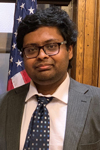 While manganese is essential in many bodily functions, both deficiency and excessive exposure can cause health issues. Maintaining a balanced diet typically provides sufficient manganese for most individuals; however, high levels of exposure can be toxic, particularly to the central nervous system. Chronic manganese exposure may result in a condition known as manganism, characterized by symptoms resembling Parkinson's disease, including tremors, muscle stiffness, and cognitive disturbances.
While manganese is essential in many bodily functions, both deficiency and excessive exposure can cause health issues. Maintaining a balanced diet typically provides sufficient manganese for most individuals; however, high levels of exposure can be toxic, particularly to the central nervous system. Chronic manganese exposure may result in a condition known as manganism, characterized by symptoms resembling Parkinson's disease, including tremors, muscle stiffness, and cognitive disturbances.
New research published in Science Signaling employs model systems and human nerve cells to show the mechanisms by which manganese inflicts damage to the central nervous system. The study also suggests that the vitamin biotin may be protective, potentially mitigating manganese-induced damage.
“Exposure to neurotoxic metals like manganese has been linked to the development of Parkinsonism,” said Sarkar Souvarish, PhD, an assistant professor at the University of Rochester Medical Center (URMC) Departments of Environmental Medicine and Neuroscience and lead author of the study. “In this study, we applied untargeted metabolomics using high-resolution mass spectrometry and advanced cheminformatics computing in a newly developed model of parkinsonism, leading us to the discovery of biotin metabolism as a modifier in manganese-induced neurodegeneration.”
Read More: Biotin May Shield Brain from Manganese Damage, Study FindsAir pollution and brain damage: what the science says
Tuesday, January 14, 2025
Post-mortem studies of human brains provide direct evidence that numerous pollutants—including nanoparticles and toxic metals—accumulate in brain tissue. Deborah Cory-Slechta, a professor of environmental medicine and of neuroscience, says she suspects that the brain can’t cope with the resulting metal concentrations, noting that, for decades, pathologists have seen elevated levels of various metals in the brains of people with neurodegenerative diseases. She is now studying how the metals disrupt brain chemistry.
Read More: Air pollution and brain damage: what the science says